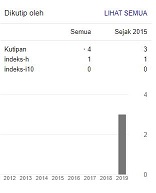DAMPAK EMOTIONAL INTELLIGENT DAN HAPPINESS AT WORK DALAM MEMBENTUK KOMITMEN ORGANISASIONAL
Abstract
Sistem teknologi dengan cepat mengalami perubahan yang dikenal dengan revolusi industri 4.0 yang berdampak kepada komitmen organisasional karyawan. Diskusi tentang kecerdasan emosional dosen sering dilakukan tetapi rumit untuk dievaluasi. Penelitian ini akan mengkaji dampak yang ditimbulkan emotional intelligent dan happiness dosen terhadap komitmen organisasional. Data disebar melalui kuesioner dan indepth interview kepada 40 dosen muda FEB UMM. Data yang terkumpul diolah dengan menggunakan alat analisis regresi berganda. Hasil Penelitian ini adalah terjadi pengaruh emotional intelligent terhadap komitmen organisasional, tetapi pengaruh happiness at work terhadap komitmen organisasional tidak sinifikan. Secara keseluruhan penelitian ini diharapkan dapat memberikan makna implikasi manajemen terhadap dosen muda dan mempunyai kontribusi terhadap literatur emotional intelligent dan happiness at work.
Keywords
Full Text:
PDFReferences
Brown, S., dkk. (2009). Generation Y in the Workplace. Public Servant Journal,21(47). 41-63.
Dhawan, E. (2012). Gen-y workforce and workplace are out of sync. Forbes.com.
Erickson, T. 2008. Plugged in: The generation yguide to thriving at work. Boston: HarvardBusiness Press.
Jex, S., M.,& Britt, T., W. (2008). Organizational psychology: A scientist-practitionerapproach. New Jersey: John Wiley and Sons Inc.
Luthans, F. (2006). Organizational behavior. New York: McGraw-Hill.
Organ, D. W., Podsakoff, P., M., & MacKenzie, S., B. (2006). Organizational citizenshipbehavior: Its nature, antecendents, and consequences. Los Angeles: SagePublications.
Payne, R., L.,& Cooper C., L. (2001). Emotions at work: theory, research and applicationsfor management. West Sussex: John Wiley & Sons Ltd.
Podsakoff, P., M., MacKenzie, S., B., Paine, J., B., & Bachrach, D., G.(2000). Organizationalcitizenship behaviors: A critical review of the theoretical and empirical literature andsuggestions for future research. Journal of Management, 26(03). 513-563.
Prihatsanti, U., & Dewi, K., S. (2010). Hubungan antara iklim organisasi dan organizationalcitizenship behavior (OCB) pada guru SD Negeri di Kecamatan MojolabanSukoharjo. Jurnal Psikologi Undip,7(1), 113-119. DOI: 10.14710/-jpu.7.1.11 -17.
Pryce-Jones, J. (2010). Happiness at work: Maximizing your psychological capital forsuccess. West Sussex: John Wiley & Sons Ltd.
Pio, R. J. (2000). The management of political behavior in organizations
(Research Report).
Pratchayapruet, T. (2008). Professionalism and ethics. Journal of Thai
Ombudsman, 1 (4), 25e80. [in Thai
Riggio, R. E. (2009). Introduction to industrial/organizational psychology
(5th ed.). Upper Saddle River, NJ: Pearson Education, Inc.
Saritwanit, S. (2009). Modern organizational behavior: Concept and theories
(2nd ed.). Pathum Thani, Thailand: Thammasat University Publication. [in Thai]
Sasomsap, M. (2004). Relationships between self-esteem, ethical work
climate, and job satisfaction as perceived by professional nurses, nonprofit private hospitals, Bangkok Metropolis (Rese
DOI: http://dx.doi.org/10.53712/jmm.v5i2.963
Refbacks
- There are currently no refbacks.
Indexing:
Aliansi:
Reference Manager:
View Statistic
Published by Prodi Manajemen Fakultas Ekonomi Universitas Madura
Jl. Raya Panglegur Km 3,5 Pamekasan
Phone: (0324) 322231
website: http://ejournal.unira.ac.id/index.php/jurnal_makro_manajemen/index
Email: makro@unira.ac.id
MAKRO by Universitas Madura is licensed under a Creative Commons Attribution 4.0 International License.







